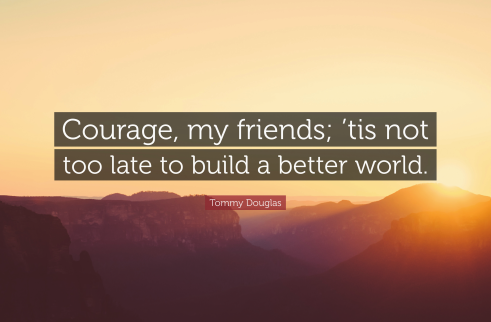By Matt Joy, Director Mission, Ethics, Research, and Reconciliation

Born in Falkirk, Scotland, in 1904, Tommy spent his formative years there before immigrating to Canada with his family when he was six years old. Prior to that momentous move, Tommy had a bad fall and cut his knee on a rock – not an uncommon reality among kids of that age. But as time went on, the wound wasn’t healing, and a rare but severe infection of the bone called osteomyelitis set in. Now, relocated to Winnipeg, young Tommy spent countless days in the hospital undergoing multiple operations to no avail. Finally, it seemed that the only option left was amputation. That was until renowned orthopedic surgeon Dr. R.J. Smith, stepped up to offer to fix Tommy’s leg for free if the family permitted him to use the surgery as a teaching case for medical students. Financially, the family couldn’t afford the alternative, so they proceeded with the doctor’s offer. The operation was a success, but this memory was pivotal in the formation of a dream that healthcare could be available to all Canadians, regardless of their wealth or status.
At the intersection of his love for people and his deep faith, Tommy Douglas pursued theological studies and became an ordained Baptist minister. Ever a voice for those needing an advocate, he saw this avenue as a way to make a significant impact in people’s lives. Newly married and ready to pastor a local church, he and his wife launched into Weyburn, Saskatchewan, in 1930. What he found there was heart-wrenching. Saskatchewan was hit hard by the recession and was experiencing a horrible drought. Farmers could no longer give their families the basic necessities, and ninety percent of them were receiving financial aid from the government. There was a complete lack of medical care for these families due to their economic realities, and Douglas knew this was not just. Reflecting on that time, he said,
“I remember burying a girl 14 years of age who had died with a ruptured appendix and peritonitis. There isn’t any doubt in my mind that it was an inability to get her to a hospital.” – Tommy Douglas
Not knowing the end result of a future national Medicare program for all, Douglas merely did his best with where he was and what he had. The church he was leading became the site of food and clothes drives, and he began to come alongside local union leaders to advocate to the government for better support for workers. Networking with ministers, teachers, and labour leaders, he broadened conversations on how to work together to better the whole of society. Courageously, on the foundation of his experience and education, Tommy Douglas went on to become the Premier of Saskatchewan and remained in that role for 17 years. By 1961, the Saskatchewan Medical Care Insurance Act was launched, and a full system of health insurance was now available to all within the province, regardless of their status or income. But it didn’t stop there. By 1966, the Canadian government had followed Saskatchewan’s lead. The national Medical Care Act came to fruition, a dream born out of adversity and compassion. It moved to action through the vehicle of courage that had come to life!

What a great call for all of us who are connected through the work and care of Good Samaritan. For some, this does take on the form of help from a faith perspective. But, for all, it looks like leaning on another. The food services staff in Gibsons, the volunteer in Medicine Hat, the health care aide in Wetaskiwin, the maintenance worker in Penticton, the spouse of a resident in Edmonton, the board member living in Edmonton, to the individual settling into their new PPDD home, and so many others along the points between, all form this incredible Good Samaritan team. Yes, there is a need for courage to face tomorrow and all the unknowns that come with it. But there is also a reality that we are not meant to face it alone. We need each other and we get to move forward, together! The Hebrew words for ‘be strong’ in the scripture above mean to fasten yourself to something. Fastened to our mission, vision, and values of healthy relationships, hospitable environments, and servant leadership, we move in courage.
What if our next five years could be our best five years?
This article originally appeared in the Winter 2023 issue of the Journey. Read this and other issues of the Journey here, or sign up to be the first to receive the Journey online or by mail.

